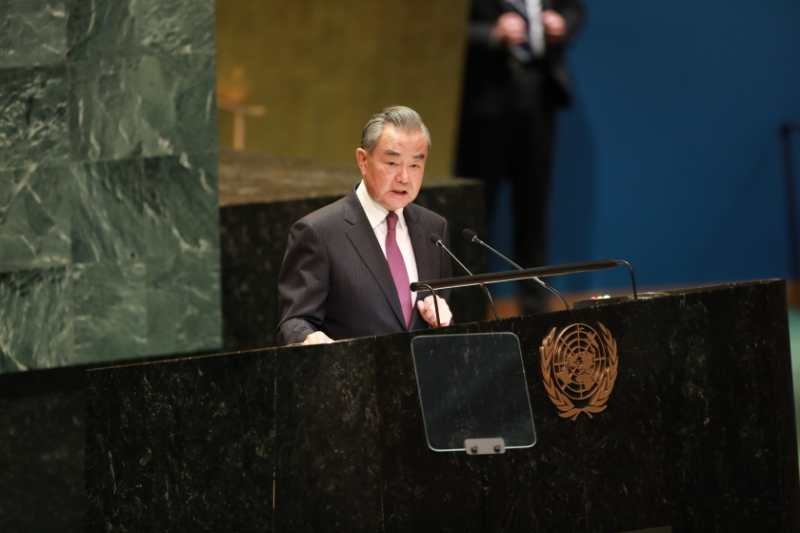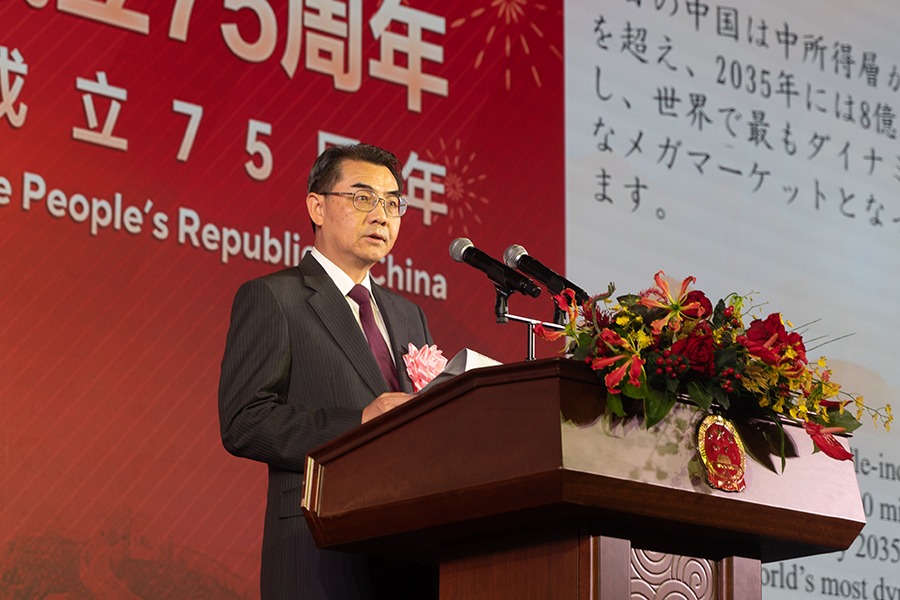China's aid programs help other Global South nations realize shared prosperity

Ogiji Sunday Uko's enriching journey in China came to an end in June, when he graduated from China Foreign Affairs University.
His experience not only broadened his understanding of international relations, but also provided him with insights into China's development model, which he believes offers valuable lessons for Nigeria and other developing nations.
The Nigerian government executive learned about a training program two years ago that would let him study at the university, and he jumped at the opportunity, as it had been his dream to study in China.
Uko, who studied in the master's program of international relations at China Foreign Affairs University, said his experience in China has very much enlightened him.
"The infrastructural development of China is amazing," he said, adding that witnessing it firsthand has shaped his view of how infrastructure could transform society in his home country.
"Studying in Beijing also helped me know more about the real image of China, more than what we are told by Western media," he said.
Uko is among 40,000 people who finished training as part of the China-proposed Global Development Initiative, which aims to provide 100,000 training opportunities to other developing countries to support their economic and social development.
Foreign Minister Wang Yi pledged in July to offer an additional 100,000 training opportunities for Global South countries in the next five years.
Following the philosophy that it is more helpful in the long term to teach people how to fish rather than just giving them fish, China has attached great importance to cooperation in human resources development, exemplifying China's evolving reform of foreign assistance.
A resolution adopted at the third plenary session of the 20th Central Committee of the Communist Party of China, which was held in July, pledged to open China's doors wider to the world's least-developed countries.
The resolution called for further reforming institutions and mechanisms for foreign aid to realize full-chain management.
Analysts said that foreign assistance is a systematic endeavor that requires a holistic approach, integrating the formulation and planning of foreign aid policies, project implementation and evaluation, in a bid to meet the needs of recipient countries as well as achieve China's diplomatic goals.
The full-chain management approach helps streamline systems and mechanisms of foreign aid, reduces management and communication costs among relevant departments, and enhances the effectiveness of foreign assistance, they added.
Challenges seen
Wang Yiwei, a professor at Renmin University of China's School of International Studies, said that foreign aid bolsters China's political influence, its ability to shape international rules and its global reputation.
The professor said that advancing foreign aid faces several challenges, as its necessity is sometimes questioned, which can affect decision-making and the implementation of relevant policies of various departments.
"It is crucial to recognize the strategic importance of foreign aid," he said, adding that departments involved in the mission must better coordinate under the guidance of the China International Development Cooperation Agency.
The agency, established in 2018, clarified the responsibilities of the foreign aid system, Wang said, adding that this reform aligns with international development practices and represents an achievement in the institutionalization of China's diplomatic efforts.
He also said that China's foreign aid reform reflects its responsibility as a major country and its commitment to achieving the United Nations' 2030 Agenda for Sustainable Development.
Zhou Taidong, vice-president of the Center for International Knowledge on Development, said that deepening the reform of foreign aid systems and enhancing the efficiency and effectiveness of such assistance are essential for meeting the growing expectations of Global South countries, resolving global development challenges, and fulfilling the goal of building a community with a shared future for mankind.
Further efforts should be made to strengthen top-level design and tailor policies for different nations and regions, while multilateral, regional and bilateral channels should be integrated to foster a comprehensive aid approach, Zhou said.
Emphasis should be put on evaluation of aid, as this plays a crucial role in measuring and showcasing the outcomes of China's international development cooperation, he said, adding that China should also promote third-party cooperation and multilateral coordination in a more active manner.
Synergy with BRI
International development aid has boosted connectivity under the Belt and Road Initiative, with a large number of flagship infrastructure projects built over the past 11 years.
Among them is the China-assisted Eastbay Expressway of Gwadar Port in Pakistan, an early harvest project finished in 2022 as part of the China-Pakistan Economic Corridor.
As a project initiated and managed by Pakistan and built by a Chinese enterprise, the host country has had decision-making authority throughout the process.
This arrangement allowed the project to be built to meet the specific needs and conditions of Pakistan, said Liu Fangtao, who was the manager of the project for China Communications Construction Co.
Despite numerous challenges, including the COVID-19 pandemic, harsh climatic conditions and security risks due to terrorism, the expressway was completed in five years.
The expressway, which serves as the only external link for Gwadar Port, solved the transportation problem and also facilitated trade and connectivity, Liu said.
By establishing and promoting its standards, China, which is renowned for its infrastructure capabilities, can gain greater influence in international aid projects, he added.
"Looking forward, there is a pressing need for China to clearly introduce its foreign aid policies and system to recipient countries, such as issuing an English version of its policies and procedures," he said.
The resolution adopted at the third plenary session in July called for coordinated efforts to promote "small yet smart" public welfare projects under the BRI, while also advancing major flagship projects.
Zhou, from the Center for International Knowledge on Development, said that the BRI has reshaped China's international development cooperation and greatly increased its global contribution to development.
Though China has a key strength in large-scale signature aid projects, which address critical infrastructure gaps and the urgent needs of developing nations, "small yet smart" projects can deliver quick results that benefit people's livelihoods, he said.
Wang, from Renmin University, said that for large-scale flagship projects as well as small-scale livelihood projects, the key lies in sustainable development, which involves ensuring debt sustainability.
"Aid cannot increase the burden on recipient countries. It should enhance accessibility while laying a foundation for their long-term development," he said.
zhoujin@chinadaily.com.cn
































